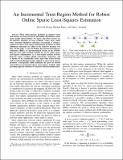An incremental trust-region method for Robust online sparse least-squares estimation
Author(s)
Rosen, David Matthew; Kaess, Michael; Leonard, John Joseph
DownloadLeonard_An incremental.pdf (670.9Kb)
OPEN_ACCESS_POLICY
Open Access Policy
Creative Commons Attribution-Noncommercial-Share Alike
Terms of use
Metadata
Show full item recordAbstract
Many online inference problems in computer vision and robotics are characterized by probability distributions whose factor graph representations are sparse and whose factors are all Gaussian functions of error residuals. Under these conditions, maximum likelihood estimation corresponds to solving a sequence of sparse least-squares minimization problems in which additional summands are added to the objective function over time. In this paper we present Robust Incremental least-Squares Estimation (RISE), an incrementalized version of the Powell's Dog-Leg trust-region method suitable for use in online sparse least-squares minimization. As a trust-region method, Powell's Dog-Leg enjoys excellent global convergence properties, and is known to be considerably faster than both Gauss-Newton and Levenberg-Marquardt when applied to sparse least-squares problems. Consequently, RISE maintains the speed of current state-of-the-art incremental sparse least-squares methods while providing superior robustness to objective function nonlinearities.
Date issued
2013-05-15Department
Massachusetts Institute of Technology. Department of Electrical Engineering and Computer Science; Massachusetts Institute of Technology. Department of Mechanical EngineeringJournal
Proceedings of the 2012 IEEE International Conference on Robotics and Automation (ICRA)
Publisher
Institute of Electrical and Electronics Engineers (IEEE)
Citation
Rosen, David M., Michael Kaess, and John J. Leonard. “An incremental trust-region method for Robust online sparse least-squares estimation.” Proceedings of the 2012 IEEE International Conference on Robotics and Automation (ICRA) (2012): 1262–1269.
Version: Author's final manuscript
ISBN
978-1-4673-1404-6
978-1-4673-1403-9
ISSN
1050-4729